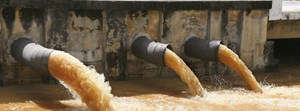Combined sewage systems increase overflow issues in Wisconsin
(UC) — Joel Brammier, president of the Alliance for the Great Lakes, voiced his concerns about how sewage systems are holding up in Wisconsin given the increased levels of rain, specifically the overflowing of older infrastructure that collects both wastewater and stormwater, according to the Wisconsin Public Radio station.
Brammeier expects the overflow issue to affect lakes and rivers soon, preventing outdoor activities like swimming or resulting in the implementation of an advisory on drinking-water. He said this will hurt local recreation and, ultimately, the local economy.
In the long-term, he predicts the overflow issue will lead to nutrient pollution that will feed “massive algae blooms.”
"The bottom line is people rightly feel we can do better," he said. "We don’t need to dump our waste — our sewage — into the open water in 2022."
The water, he said, not only ends up in rivers and lakes but also the homes and businesses of the local community. The damage of the flooding can cause severe property damage, while extreme storms can cause millions of dollars in damage.
However, Brammeier has placed his hope in a Milwaukee effort that would eliminate combined sewer overflows, known as CSOs.
"These are expensive projects," he said. "One thing that's clear is that water is collective, right? We're all in this together — whatever your political stripes are. And so, I have been impressed with some of the ways that Milwaukee has approached trying to solve this problem."
While on WPR’s "The Morning Show" Brammeier discussed how states experiencing more rainfall and extreme precipitation can handle CSOs.
According to his estimates, there are about 150 permitted combined sewer systems in the Great Lakes Region, but while the number of overflows have reduced significantly over the last 20 years, it’s still a concern for Wisconsin residents.
While the combined sewer systems are common in other cities within the state, the majority of cities with overflow issues are communities with fewer than 10,000 people, according to the U.S. Environmental Protection Agency.
The report found that one city that falls in that category is Ashland, which sits on the shore of Lake Superior. Ashland’s Mayor Deb Lewis is especially worried by the city’s sewer system, she told WPR.
"The sewer overflows have become a chronic problem in the last several years," she said. "Not frequent, but one is too many."
In 2010, the Milwaukee Metropolitan Sewerage District aimed to eliminate overflows and basement backups and implement an improved storm water management system by 2035.
Making the water systems more environmentally friendly couldn’t only be done through "gray infrastructure," Milwaukee Magazine reported in 2019, saying that the district went after greener alternatives, such as "porous pavement, green roofs, bioswales and other patches of native plants and soil that soak up rainwater rather than channeling it into sewers."
Brammeier said Milwaukee is buying and managing land and upper parts of watersheds "to enhance water quality and reduce the volume of water that's going into the rivers upstream, which helps address water quality and flood risk downstream."
He said the city is also bringing in private financing to help encourage more green infrastructure.
"In a lot of Midwest cities, you can't use concrete and holes in the ground that are big enough to solve this problem," he said. "You've got to find a way to capture some of this water where it comes down on the ground, and that's where green infrastructure comes in."
Brammeier said states and municipalities can use federal infrastructure dollars to address this matter locally. Without such funds, these places would have trouble affording necessary solutions, he said.
"In cities and towns and rural areas and urban neighborhoods ... ratepayers simply aren't going to be able to afford to pay the full cost of getting to clean water," he said.
Related News
From Archive

- Glenfarne Alaska LNG targets late-2026 construction start for 807-mile pipeline project
- U.S. water reuse boom to fuel $47 billion in infrastructure spending through 2035
- $2.3 billion approved to construct 236-mile Texas-to-Gulf gas pipeline
- Major water pipe break in Puerto Rico hits over 165,000 customers
- Potomac River Tunnel project enters construction phase beneath Washington, D.C.
- Pennsylvania American Water launches interactive map to identify, replace lead water service lines
- Trump's tariffs drive $33 million cost increase for Cincinnati sewer project
- Utah city launches historic $70 million tunnel project using box jacking under active rail line
- Tulsa residents warned after sewer lines damaged by boring work
- Fatal trench collapse halts sewer construction in Massachusetts; two workers hospitalized




Comments